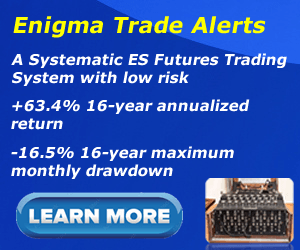The phrase “Have a Plan; Trade Your Plan” has been used over and over again, and applies to many different business applications. I am a firm believer in having a plan, whether it is a one month plan, one year plan, or a 10 year plan, to achieve your goals in life. Do you have a plan? What goals are you expecting from your trading? This will vary from trader to trader, depending on your desired trading results, lifestyle, and risk tolerance.
Why have a plan?
Every trader knows that in order to be successful over time, controlling losses is even more important than more having more wins than losses. A good trading plan is essential to your success as a trader. Without a plan, you are simply trading by the skin of your teeth. It may seem to work well for awhile, but human nature (greed, self-doubt, etc.) will ultimately get in the way of consistent success. There is an old saying in the business world: “Fail to plan and you plan to fail”. It may sound harsh, but those serious about being a trader who remains profitable on a consistent basis should follow these eight words as if they were written in blood. Any successful trader will tell you, “you can either methodically follow a written plan, or fail.”
What are the necessary components in a trading plan?
- Mission Statement. What is your purpose for trading as a business? What are you trying to achieve, and why is that important to you?
- Skill Assessment. Are you ready to be trading live capital? Have you tested the strategies by paper trading it, and do you have confidence in the strategies? Do you feel you will be able to follow your entry/adjustment/exit signals without any hesitation? Trading can be a challenging business, and the most successful traders are prepared to take whatever course of action is required.
- Portfolio Allocation. Know in advance of trade entry exactly how much capital you will allocate to each strategy, including any adjustments necessary during the trade cycle.
- Set Goals. Before you enter any trade, set realistic profit targets and maximum loss points. Set weekly, monthly, and annual profit goals, either in dollars, or as a percentage of capital on each trade strategy.
- Set precise exit rules. Many traders make the mistake of focusing more energy on entering a position, and not the exit. It's much easier to enter a trade than to exit, but exiting is so much more important. In order to be successful as a trader, it is critical to have a clear exit plan in place before entering any position.
- Set entry rules. It may seem a little backwards listing entry rules after exit rules. But as stated above, exits are far more important than entry. Whatever type of strategy you trade, have a clear outline of the guidelines which trigger a trade entry. Have these written down as part of the trade plan.
- Keep good records. Successful traders are good record keepers. When they win a trade, they record exactly why and how. More importantly, they want to know the same after a losing trade. Accurate records may eliminate the potential for unnecessary mistakes in a future trade. Minor details such as entry and exit time, market open, pertinent economic news during the cycle of the trade, etc., are important to record. Save your trading records so you can go back and analyze specifics of a previous trade. Remember, trading is a business and good record keeping is critical to any business.
Successful traders recognize that trading is a business. While having a trading plan is not a guarantee that you will be profitable, it is crucial if you want to manage your business in the most professional manner. Any business' long term success, including trading, is only as good as the business plan under which it operates. If you put in the time, energy and effort into developing your own trade plan, you will likely see an increase in your trading success.


